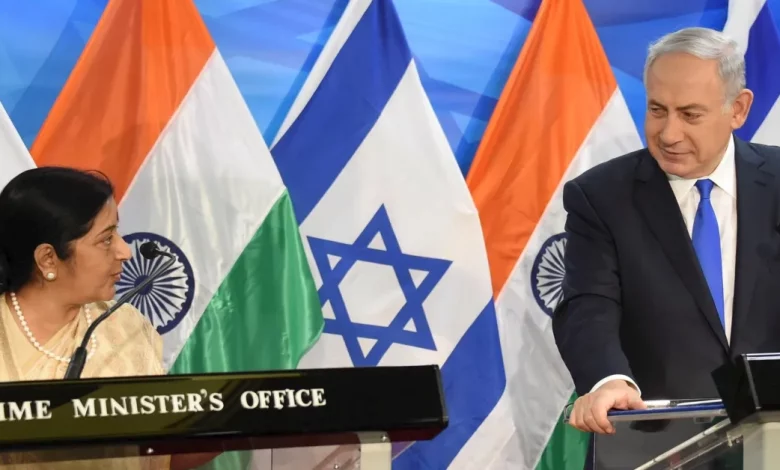India’s relations with Israel and Palestine
[GS Paper 2 - International Relations, India & its Neighborhood]

Context – The recent attack by Hamas (Arab sponsored Jihadist outfit) on Israel has prompted PM Modi to express solidarity with Israel, highlighting the complex nature of India’s relations with both Israel and Palestine. Over the past seven decades, India’s stance on these nations has undergone significant shifts, reflecting its evolving foreign policy priorities and diplomatic considerations.
India’s foreign policy has always been characterized by a delicate balancing act, particularly in its relations with Israel and Palestine. The recent escalation of conflict between Israel and Hamas, the Palestinian militant group, has once again brought India’s stance on this long-standing issue into the spotlight. As India navigates the complex geopolitics of the Middle East, it faces a challenging task in maintaining its historical support for the Palestinian cause while also deepening its strategic ties with Israel.
About Israel-Palestine Conflict
- Historical Background: The land of contention was under the Ottoman Empire and later the British Empire.
- Anti-Semitism as Official Policy: Several Islamic countries, including the Arab world, Turkey and Pakistan, have officially expressed hatred against Jews citing reference to religious scriptures.
- Denial of Access: Jews, as a micro-minority of the world, have been denied access to their historic homeland.
- Arab Resistance: Arabs resisted, claiming the land as their own, known as Palestine at the time.
- Balfour Declaration: In 1917, the United Kingdom expressed support for the establishment of a Jewish homeland in Palestine.
- Violent Resistance: Arab resistance to the declaration led to violence and further tensions.
India’s Evolving ties with Israel & Palestine
- India’s relationship with Israel and Palestine has evolved significantly over the years. Historically, India has been a staunch supporter of the Palestinian cause, dating back to its recognition of the State of Palestine in 1988.
- This support has been rooted in India’s commitment to anti-colonialism and solidarity with oppressed nations. At the same time, India did not establish formal diplomatic relations with Israel until 1992, partly due to concerns about alienating its Arab allies.
- In recent decades, India’s relations with Israel have deepened significantly, extending beyond defense and security cooperation to encompass agriculture, technology, and trade.
- Israel has become a valuable partner for India in areas such as water management, agricultural innovation, and counter-terrorism. These ties have brought tangible benefits to India, contributing to its food security and economic development.
- Furthermore, India’s evolving relationship with Israel is driven by shared strategic interests, including counter-terrorism efforts and a common concern about the proliferation of nuclear weapons in the region.
- Israel’s expertise in defense technology and intelligence sharing has been crucial in enhancing India’s national security capabilities.
- While India’s engagement with Israel has grown, its support for Palestine has remained unwavering. India consistently advocates for a two-state solution, with an independent and sovereign Palestine living alongside Israel in peace.
- It has also provided humanitarian aid to Palestine and supported various United Nations resolutions condemning Israeli settlements in the West Bank.
Balancing Act Amidst Escalation:
- The recent Hamas attack on Israel, which led to a violent conflict in Gaza, presented India with a significant diplomatic challenge. As the world witnessed the exchange of rocket fire and casualties, India issued statements calling for an immediate ceasefire and expressing concern about civilian casualties.
- India’s position underscores its commitment to the principles of international law, including the protection of civilian lives and respect for sovereignty.
- At the same time, India also reaffirmed its support for a two-state solution and reiterated its commitment to the Palestinian cause.
- This balanced approach reflects India’s historical stance and its desire to play a constructive role in resolving the Israel-Palestine conflict.
Challenges and Considerations
- Geopolitical Realities: India’s strategic partnership with Israel is driven by its national interests and security concerns. The changing geopolitical landscape in the Middle East, with the normalization of relations between Israel and some Arab nations, has created new dynamics that India must navigate carefully. India cannot ignore the shifting sands of the region.
- Domestic Pressure: India’s stance on Israel-Palestine is also influenced by domestic factors, including its large Muslim population and political considerations. Indian governments must be attentive to the sentiments of different sections of society while formulating their foreign policy.
- Global Diplomacy: India’s position on the Israel-Palestine issue must be in harmony with its broader foreign policy objectives, including its aspirations for a permanent seat on the United Nations Security Council. India’s role in international forums such as the United Nations should reflect its commitment to a just and peaceful resolution of the conflict.
Way Forward
India’s relationship with Israel and Palestine is emblematic of its ability to maintain a delicate balance in its foreign policy. The recent Hamas attack on Israel highlighted the complexities and challenges that India faces in managing these ties. India’s support for a two-state solution and its emphasis on diplomatic efforts to bring about peace remain consistent. However, its deepening strategic partnership with Israel necessitates a nuanced and pragmatic approach.
SOURCE: The Hindu
Practice question:
Q. The term two-state solution is sometimes mentioned in the context of the affairs of-
- China
- Israel
- Iraq
- Yemen





.png)



